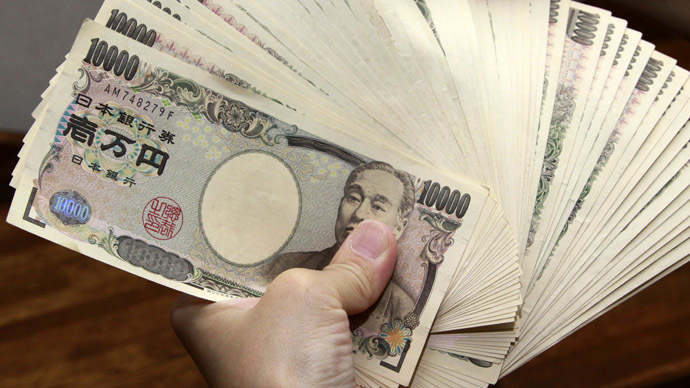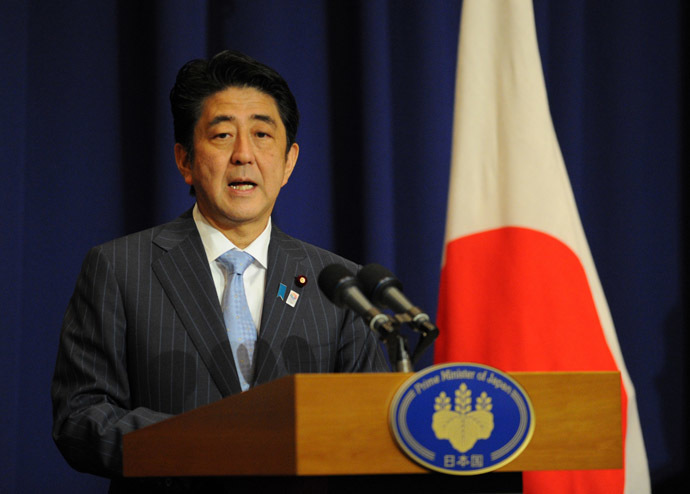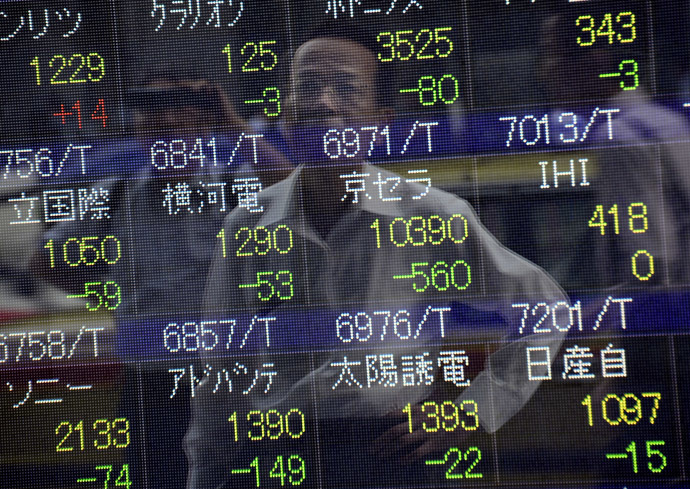Financial Fukushima: Is ‘Abenomics’ making Japan ‘Abenauseous’?

While Japan faces mounting risks and a dangerous cleanup at the failed Fukushima nuclear plant, the situation may be similarly bleak for the Japanese economy in the short term.
Ladies and Gentlemen, Japan is basically screwed. There are no
two ways about it – with its rapidly-aging population, the
unmanageable environmental disaster in Fukushima, and government
debt to GDP levels at a staggering +240 percent, Japan will soon
be teetering on the brink of a very turbulent situation.
Mainstream financial pundits and prominent Western economists
have had a lot of nice things to say about Japanese Prime
Minister Shinzo Abe's highly-touted ‘Abenomics’ economic
reform program, and Abe’s strong mandate in recent parliamentary
elections was treated as a green light to continue pressing
ahead. But there is reason to believe that Japan may not be able
to finance its gargantuan pile of debt for much longer.
The Abenomics recovery program took a three-pronged approach; the first was to fire up the printing press for a massive round of quantitative easing (QE) that would make Ben Bernanke blush. Japan’s idea is to inflate itself out of a 23-year deflationary spiral by gradually doubling the money supply, boosting inflation to 2 percent, thus inflating away some of the debt and boosting Japanese exports off the back of a weakened yen.
The second move is a stimulus program that saw the Bank of Japan
(BOJ) invest $1.06 trillion in Japanese government bonds (JGBs)
marking the first time it has purchased bonds with more than
three years’ remaining maturity.
The strategy is to create money out of thin air, buy government
bonds en masse from private institutions and bondholders, who
would then put that money back into the economy to bring
inflation up.
The third measure is making structural reforms that promote
liberalization in the interests of big business, the centerpiece
being the opening up of deregulated and lightly taxed zones
around the country.
Abe is also expected to announce more drastic structural reforms in labor and agriculture off the back of his strong showing in July’s pivotal parliamentary polls, which could include measures that would allow employees to be fired (which firms are barred from doing under existing law), and allowing companies to purchase farmland (which they can only rent with strict conditions under existing law) to the detriment of small farmers.

The next Greece?
Pumping cash into financial markets has caused the Japanese stock
market to soar, but an unintended consequence of the money
printing has been extreme interest rate volatility, a possible
precursor to an unexpected selloff in JGBs that could tank the
Japanese economy.
I recently interviewed Japan-based journalist James Corbett, who
claimed that the real risk lies in the Japanese bond market and
that increasing volatility is a sign that Abe does not have a
firm grip over the situation.
Corbett told me that if the bond market “becomes destabilized as a result of unforeseen consequences of Abenomics, not only is the government's ability to continue financing its mountainous debt called into question, but so is the stability of much of the Japanese banking system which has large exposures to that bond market… With debt-to-GDP already the highest in the developed world and more of Japan's aging population beginning to retire and draw on their JGB holdings rather than purchasing fresh ones, the Japanese government may be unable to stem the coming carnage.”
Japan's latest GDP figures are also unimpressive, showing growth
at 2.6 percent for the second quarter of 2013, down from 3.8
percent in the first quarter, while private capital investment
has actually fallen by 0.3 percent.
Inflation is also having other negative consequences – it was
intended to give Japanese products the edge in export markets,
but has instead resulted in the doubling of the trade deficit and
mounting fuel and energy costs, which does more to eat into
average incomes. The fall of the yen as a result of money
printing has also given rise to a currency war, which may
culminate in a ‘race-to-the-bottom’ scenario from competitors in
Germany, South Korea, and elsewhere whose exports won’t easily be
able to compete with cheaper Japanese products.
Japan’s government debt, widely considered to be the world’s highest, is 24x government revenue, while interest expenses take up roughly 25 percent of government revenue. The IMF recently warned Japan that volatility in the JGB market is one of the principal macro-financial risks for Japan, and if Abe cannot keep interest rates under control, it means that more and more of the government’s core revenue stream (from taxes) will go to paying interest expenses, to the point where it would have to borrow nearly every yen it spends – meaning the eventual insolvency of the world’s third largest economy.

We’re gonna need a lot of ink…
The problem with the approach taken by the Japanese government is
that money is being injected into the financial system and the
stock market, but the money velocity is low because it is not
trading hands in the real economy – demand and activity remain
stagnate.
Wages in Japan have been on the decline since 1998, and moves to
tax big business at a higher rate than labor are unforeseeable,
so there are bleak chances for meaningful wage increases and a
rebound in consumption.
The agenda is a familiar one – the deregulation of energy and financial sectors, the privatization of public assets and industries, and reforms in line with the free trade mantra espoused by the Washington consensus. Japan is taking part in trade negotiations to join the secretive Trans-Pacific Partnership (TPP), a US-led plurilateral free trade agreement that will fundamentally change the way business is conducted in the signatory countries when passed into law, and as a result, the Abe government may be legally obliged to make even more dramatic structural reforms in-line with the TPP’s oppressive stipulations.
While Abe is luring in multinationals with tax-free havens and
structural reforms that serve big business, he’s expected to
introduce an increased consumption tax – from the current 5
percent to 10 percent by 2015 – which will almost certainly lower
personal consumption when coupled with rising energy costs and
stagnating wages.
BOJ Governor Haruhiko Kuroda is gunning for increased consumption
taxes, and when asked about the possibility of a slowdown as a
result of the increase, he acknowledged that the central bank
“won’t hesitate” to fire up the printing press – and so
the cycle continues.
Meanwhile, the economic losses generated by the Fukushima disaster are upwards of $500 billion, while cleaning costs amount to around the same number.
Japan is in no position to care for its ageing population and the
hundreds of thousands of radiation-exposed cancer patients that
will emerge in the years to come. Strap yourselves in folks –
this is going to get very ugly.
The statements, views and opinions expressed in this column are solely those of the author and do not necessarily represent those of RT.
The statements, views and opinions expressed in this column are solely those of the author and do not necessarily represent those of RT.













